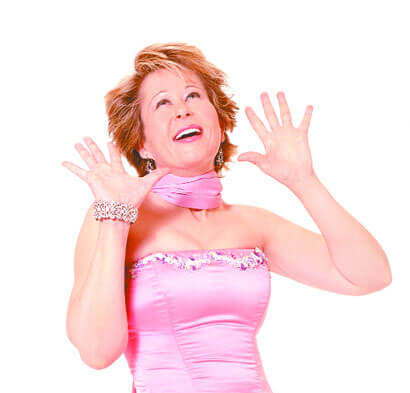Yeardley Smith, the voice of Lisa Simpson, has some answers
What would you do if all your childhood dreams came true—sort of?
This is the dilemma that drives Yeardley Smith. The 39-year-old actress, best known as the voice of eight-year-old Lisa Simpson in “The Simpsons,” which at season 16 is now the longest-running sitcom in history, comes to Gotham with her one-woman show, “More,” a bare-all exposé that looks at the woman behind the unmistakable voice.
Smith says that when she was five, she dreamed of stepping out of a limo onto a red carpet, where adoring fans screamed her name, and flashbulbs popped. But despite regular TV and film appearances, and the unparalleled success of “The Simpsons,” Smith’s success has come at a price to her private life, including struggles with bulimia, depression, and self-doubt as well as adultery and other relationship disasters.
As Smith says in her show, her acting career was beleaguered by the “conflict over the desire for more of everything, and the nagging belief that I don’t deserve any of it.”
She chatted recently with Gay City News.
Winnie McCroy: You share a lot of intimate details in your one-woman show “More,” from bulimia to low self-esteem to nearly being bilked for $20,000 by a tile guy man named Vince who says he hired hit men to take care of your stalkers. Do you feel exposed up there?
Yeardly Smith: Absolutely! I have a friend Alec Mapa who writes one-man shows, and he said to me that when he feels like he’s revealed too much, he knows he’s in the right place. It’s the best advice I could’ve gotten. When I’m up there, I’ve never been more naked; but I guess I’m supposed to feel like that!
WMcC: You have had a string of successes, but you felt unfulfilled as an actor, like nobody knew the real you, even saying at one point, “As badly as I want [success] I’m ashamed to want that much for myself.” With “More,” you lay it all on the line, and say, “Here I am.” Have you fulfilled the need to tell your story?
YS: Definitely. The whole project has been hugely gratifying, but it’s also of course the hardest work I’ve ever done. But the rewards have been many and unexpected. I decided to do this to create a job for myself, and I ending up doing so much more. I think that I satisfied my creative appetite in a way I never expected. Also I felt I was a better actor because my director Judith Ivey never let me get away with anything. She was extraordinarily detail-oriented and never let me settle for anything less than the best I was capable of.
WMcC: In your show, you use a timeline—Neil Armstrong, Son of Sam, the Moonies—against which you mark your own accomplishments. But it doesn’t seem like you have a sense of how your own successes figure into the world. Can you see more clearly since you staged “More” that, despite getting shitty tables at the Academy Awards, you are a successful working actress with a lot to be thankful for?
YS: I think I can now, but it has to be said that the disconnect I felt about my own success came out of a separate set of rules I set for myself. I was so wedded to my to-do list. If it wasn’t on the list, it wasn’t on my radar. If I had any advice for the young ones, I would say make a list then throw it away. It’s good to have goals, but also you need to go with the flow at some point. I have been somewhat criticized as this rich kid, this wealthy actress whining about not having work, that I should get a life…. But we are supposed to strive for more, to get a lot but not too much, don’t settle but don’t be too hungry—it’s impossible to do that. I agree that I’ve had an incredible amount of success, I’m able to support myself, but I don’t know why that should be enough.
WMcC: You are most famous as Lisa Simpson. How are you like Lisa?
YS: I think I’m a lot more like Lisa Simpson than not. We’re similar in that Lisa has a genuine lack of understanding when there is a lack of humanity. She believes in the goodness in the world, and there is pretty much nothing you could tell her that could make that not so. As a kid, I struggled to find a place where I belonged. My theory is anytime you’re young and do something very well, it sets you apart from your peers and kids really just want to belong. For Lisa, it’s being so smart, playing the saxophone, having an uncanny eye for the big picture. For me, I had a lot of drama at young age, and got a lot of attention. But if I could be remembered for one thing, it would be Lisa.
WMcC: In “The Legend of Billie Jean,” your character Pepper took just as strong a stand as Helen Slater’s character, and had just as strong an influence on budding rebels. “Ginger Ale Afternoon” even got you a naked topless shot on the Internet. Seems like you had a lot of fun with these trailer park roles. Is there a secret, trashy side to you?
YS: [Laughs] There is a secret loud, mouthy side to me, the girl who will drink too much and dance on the table all night. It’s that which I call Lola in the show, the girl who brings her Emmy with her to the supermarket. That part of me lives close to surface, because of the way I was brought up. I really closeted her for a long time, but the problem with that is the thing you are hiding gains momentum and energy. I’m not known for drinking in excess and dancing on tables, but the extroverted, loud part of me doesn’t go away even if I kick it under the dirty laundry— it’s ready to kick the door down. So doing the show is a way to get balance between the demure and the party Yeardley.
WMcC: In the show, your to-do list said: lose weight, get rich, get famous, get married, be happy. Seems like you’ve done that. What’s your to-do list for the rest of the time you’re in New York?
YS: I want to stay in the moment and not leap to the future. I know some of The reviews were mixed, though there was a lovely piece in the Times, but all of it is completely irrelevant. Whether 50 or 500 people show up, my job is still the same, and the only way I can honor that commitment to the audience as well as myself is to stick with what I need to get done. I used to obsess about that, thinking that means the show won’t run for a year and a half, but what it really means is some people got it and some didn’t. The point is to tell your story, to touch some lives, to create a job for myself, and it’s enormously exhilarating, so shut up and do your job! I met my goal and in many ways succeeded it.



































